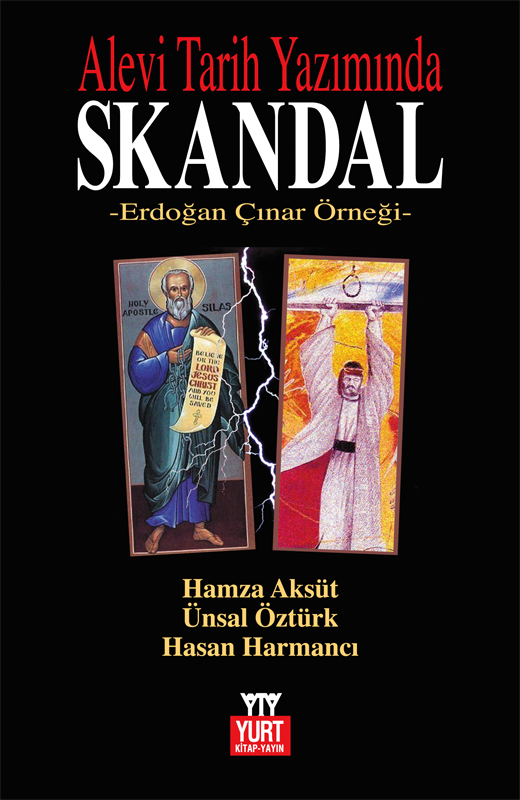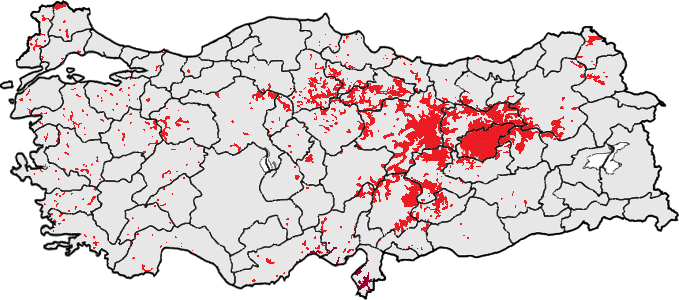A
huge scandal - but also the central focus of intense discussions
- has befallen Turkey, on account of a book by
Erdoğan Çinar
and a group of Turkish researchers, titled "Scandal: The History
of the Alevis".

In the description of the Alevis' history, he maintains that the
Alevis of Turkey are in actual fact the lost Christians of Asia
Minor - a truly vast historical problem, to which contemporary,
official Turkey systematically avoids giving convincing answers.
According to the book's author, the Alevis are the lost
Christian flock of Asia Minor - lost during the prevalence of
the Ottomans - and that in many cases, the religious centers of
the Alevis were built atop Christian churches.
Çınar
goes as far as asserting that all the Alevi Elders (Dedes) are
but Christians who in their desire to avoid forced Islamisation,
had resorted to creating an Islamic heresy with many Christian
elements. He attributes a Christian and even an ancient
Hellenic origin to the major religious center of the Alevis -
the Hacibektas of Cappadocia - by pointing out the existence in
that very place of an older temple of Zeus, and a later
Christian monastery. He even relates the Apostle
Paul, the founder of the Christian church in Macedonia as he
characteristically mentions, to the great spiritual leader of
the Alevis, who was none other than the
Pir Sultan Abdal.
The Turkish author even invokes the writings of the renowned
Turkish traveller of the Ottoman empire,
Evliya
Çelebi, in order to support that the influences of the
Apostle Peter, the Apostle Matthew from Urfa of south-eastern
Asia Minor, and even of the Empress Anna Comnene were
determinative for the faithful (later Alevis), thus
raising a huge historical scandal over today's Alevis of
contemporary Turkey.

Alevis in Turkey
This book naturally provoked intense reactions and discussions,
once again bringing to light the serious problem of Alevis,
which continues to be a large "thorn" with regard to the
cohesion of the Turkish State. It is a fact, that, because of
the marked rise in political Islam and the Sunnis in Turkey, the
matter of the religious minority of Alevis has taken on a
special political significance. The recent decision by the
Turkish government on the 19th July 2012 to once again not
recognize the "Cem Evleri" - that is, the religious centers of
the Alevis - has heightened this problem. This matter is
of extreme importance, if one were to consider that the
minority that comprises the Alevi populations reaches up to 20
million - a fact that implies yet another "tinderbox" in the
foundations of modern-day Turkey.
The
uncontested historical truth is that the Alevis appeared in a
region of north-eastern Cappadocia, where there was a dense
Greek-Orthodox Christian population. Many of the Christian
elements that are observed in the Alevis are seen as actual
grounds by those who support the view of their lost Christian
identity. The Alevis believe in Saint George, while
Confession of new members was implemented, and, following
Confession, they would be given wine to drink and bread and
cheese to eat. Their "monks" observed celibacy, and were
reminiscent of Christian monasteries in many other aspects.
Their beliefs have many common points with the Orthodox
Christian presence in Asia Minor, which is why at quite an early
stage they had attracted thousands of Greek Orthodox to their
ranks. A unique ritual of theirs which reminded us of the
Last Supper was the Alevi tradition of a ritual meal. The
women preserved the status of freedom and of equality with men -
a status that had existed ever since the ancient era among the
Hellenes of Asia Minor. Even Ottoman historians such as Yakoub
and Hasluk have stressed that Alevism owes much of its own
beliefs to the Christian beliefs and rituals of the inhabitants
of Asia Minor.
The highlight of all the above was the Alevi belief regarding
the Holy Trinity, a point that brought the Alevis even
closer to the Hellenic Orthodox Christianity of Asia Minor.
The unity between God, Mohammed and the Prophet Ali was the
Alevi version of the Holy Trinity. However, the Orthodox
influence of the Hellenes was also expressed in other ways,
such as the pilgrim sites or the locations that were regarded as
sacred by the Christians, which until this day, also continue to be Alevi pilgrimage sites.
Most
assuredly, this problem of the true identity of the Alevis which
preoccupies modern-day Turkey from time to time is yet another
"link" in the chain of identity problems that are the cause of "creakings"
- and at times "earthquake tremors" - in today's Turkish regime.
********************************************
Special note:
Alevism (Alevilik) is a
group identity which is variously interpreted as religious
(combining Anatolian folk Shi'ism with Sufi elements such as those
of the Bektaşi tariqa) sub-ethnic (within larger Turkish, Kurdish,
and Zaza communities) cultural (emphasizing special traditions of
poetry, music and dance), and/or humanistic and political (whether
leftist or Kemalist). Estimates of the Alevi population place them
somewhere between fifteen and twenty million people, primarily in
Turkey. (Olli Rehn, from the 1996 (Camiel) "Eurlings Report" to the
European Commission , on the suitability of Turkish accession to the
EU . Also see "Alevism," from The Encyclopedia of the Orient). Alevi
worship and other social activities take place in assembly houses (cemevi). The
ceremony (âyîn-i cem, or simply cem) features music and dance (semah)
in which both women and men participate. Rituals are performed in
Turkish, Zazaki, and other local languages—not in Arabic, as in
other Muslim groups.
"Alevi" is generally
explained as referring to ‘Alī ibn Abī Tālib, the cousin and
son-in-law of Muhammad. The name represents a Turkish form of ‘Alawī
(Arabic: علوي) "of or pertaining to ‘Alī".Even though the term
Alevi is simply the Turkish derived form of Arabic ‘Alawī, the Arab
form of the term today refers to the distinct group of the
Arabic-speaking ‘Alawī of Syria.
Alevis believe in the
unity of Allah, Muhammad, and Ali, but this is not a trinity
composed of God and the historical figures of Muhammad and Ali.
Rather, Muhammad and Ali are representations of divine energies, the
first of which is Allah.
Alevism (Alevilik) is a
group identity which is variously interpreted as religious
(combining Anatolian folk Shi'ism with Sufi elements such as those
of the Bektaşi tariqa) sub-ethnic (within larger Turkish, Kurdish,
and Zaza communities)cultural (emphasizing special traditions of
poetry, music and dance), and/or humanistic and political (whether
leftist or Kemalist). Estimates of the Alevi population place them
somewhere between fifteen and twenty million people, primarily in
Turkey. (Olli Rehn, from the 1996 (Camiel) "Eurlings Report" to the
European Commission , on the suitability of Turkish accession to the
EU . Also see "Alevism," from The Encyclopedia of the Orient.).
Alevi worship and other
social activities take place in assembly houses (cemevi).
The ceremony (âyîn-i cem, or simply cem) features music and dance (semah)
in which both women and men participate. Rituals are performed in
Turkish, Zazaki, and other local languages—not in Arabic, as in
other Muslim groups.
"Alevi" is generally
explained as referring to ‘Alī ibn Abī Tālib, the cousin and
son-in-law of Muhammad. The name represents a Turkish form of ‘Alawī
(Arabic: علوي) "of or pertaining to ‘Alī". Even though the term
Alevi is simply the Turkish derived form of Arabic ‘Alawī, the Arab
form of the term today refers to the distinct group of the
Arabic-speaking ‘Alawī of Syria.
Alevis believe in the
unity of Allah, Muhammad, and Ali, but this is not a trinity
composed of God and the historical figures of Muhammad and Ali.
Rather, Muhammad and Ali are representations of divine energies, the
first of which is Allah.
***********************
(*) Turkology
(Turkish: Türkoloji), also Turcology or Turkologie, is a complex of
humanities sciences studying languages, history, literature,
folklore, culture, and ethnology of people speaking Turkic languages
and Turkic peoples in chronological and comparative context. This
includes ethnic groups from the Turks (Turkish People), Sakha in
East Siberia to the Balkan Turks and Gagauz in Moldova.
Translation K. N.
